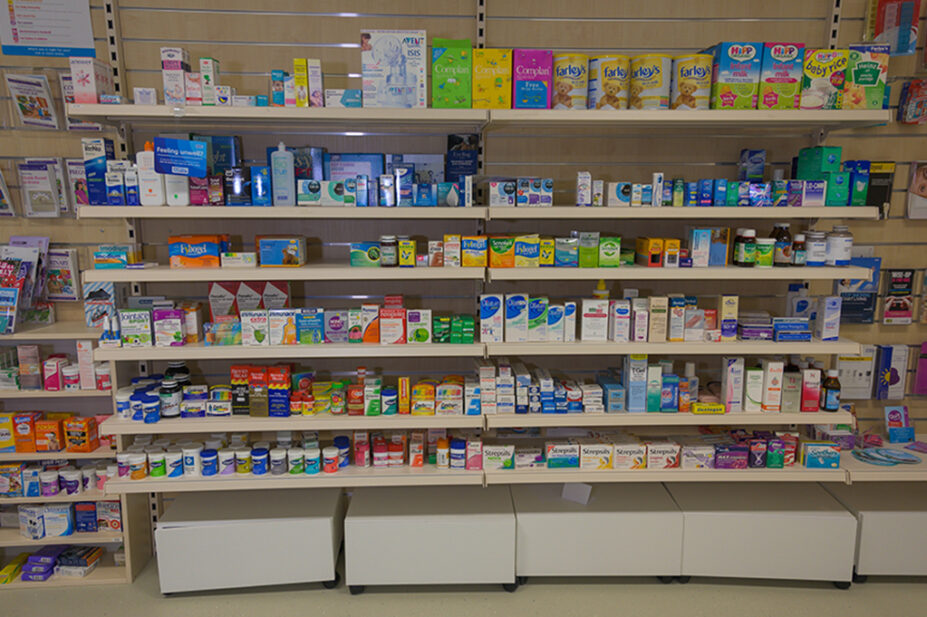
Shutterstock.com
Pharmacists “overwhelmingly” oppose the self-selection of Pharmacy (P) medicines in pharmacies, according to a report published by the Pharmacists’ Defence Association (PDA).
In its report — ‘Beyond convenience — Protecting patients: the case against liberalisation of P medicine sales’, published on 13 February 2025 — the PDA highlighted the “overwhelming opposition to making P medicines available on open display for self-selection, primarily due to concerns over patient safety, inappropriate use, and the increased risk of harm”.
Citing evidence from a survey of 1,323 PDA members carried out in July 2024, the report revealed that 93% of respondents opposed the concept of self-selection of P medicines.
Of these respondents, the PDA report said 94% cited concerns around difficulty in supervision, 96% had concerns about inappropriate selection and 87% had concerns about disputes or violence relating to self-selection.
A statement published alongside the report said: “The PDA asserts that restricted access and pharmacist supervision is not just beneficial, but essential for ensuring the appropriate use of P medicines, preventing harm or misuse, and providing professional advice.
“The current regulatory framework, which mandates restricted access and pharmacist intervention, not only minimises medication errors but also ensures public safety. Any changes to the current model should only be made following full consultation with pharmacists, ensuring decisions align with best practices in medicine safety and patient care,” it added.
Currently, P medicines can only be sold from a registered pharmacy premises or registered online pharmacy by a pharmacist or someone acting under the supervision of a pharmacist. However, the legislation does not prohibit the self-selection of P medicines.
In July 2024, the Royal Pharmaceutical Society (RPS) published a call for evidence on the facilitated self-selection of P medicines, after a meeting of its national pharmacy boards in June 2024, in which it discussed its current stance on the practice.
In its report, the PDA noted the contrast between the General Pharmaceutical Council’s (GPhC) terminology of “facilitated self-selection” and the RPS’s professional standards, which state that “pharmacy medicines must not be accessible to the public by self-selection”, means pharmacists now face this “juxtaposition between the GPhC’s terminology and the RPS’s longstanding professional standards”.
“This lack of coherence undermines the pharmacists’ role and risks weakening established safeguards, ensuring patient safety remains central to regulations and professional standards,” it added.
Claire Anderson, president of the RPS, said: “The GPhC inspection approach only enables the facilitated sale of P medicines under certain conditions, with assurance of key safeguards being in place. This practice has prompted RPS and other organisations to review areas of work related to the sale of P medicines.
“As the professional leadership body for pharmacists in Great Britain, RPS plays a key role in setting professional standards which help prioritise patient safety while supporting pharmacists and their teams in safely meeting regulatory standards.
Anderson added that, following the RPS’s call for evidence, its own systematic evidence review “is planned for peer review and serves as the basis for supporting our elected members in making recommendations for next steps, ensuring that patient safety remains at the heart of practice”.
Jay Badenhorst, director of pharmacy at the PDA, commented: “[The report] highlights the critical role community pharmacists play in providing accessible, expert care … [reinforcing] the vital importance of maintaining pharmacists at the heart of pharmacy and why they must remain as the cornerstone of access to medicines.
“With the healthcare landscape rapidly changing, it is more important than ever that pharmacists remain the go-to professionals for medicines expertise, ensuring patients receive the highest standard of care in their communities.
“We will continue to champion the voice of pharmacists on key issues, such as the self-selection of P medicines, to ensure the profession’s role in patient safety and care is safeguarded,” he added.
Roz Gittins, chief pharmacy officer at the GPhC, said: “We fully agree with the PDA that pharmacists play a crucial role in protecting patients by providing expert advice, ensuring the appropriate use of medicines, and preventing potential drug interactions.
“Our position continues to be that open display of P medicines is not compatible with regulatory requirements without key safeguards being in place. This includes ensuring continued compliance with the current legal requirement for pharmacist supervision, and assurance that where facilitated self-selection is available, the systems and processes ensure patient and public safety,” she added.
“We will continue to check for associated compliance as part of our usual regulatory processes, including during inspections of pharmacy premises.
“We look forward to continuing to work closely with the PDA and value their input on this very important issue”.
1 comment
You must be logged in to post a comment.



I will be showing my age but history open display of P meds was allowed as the pack size eg 2-3 days upto 5-7 days worth supply ( supply was limited ) and the quantity on open display ( near the top of the orc sales counter near sales assistant reach and not patient public arms reach ) and or was also the quantity was limited… or the medicine in larger supplies was behind the counter on display or behind the counter and not on display eg larger monthly 2 monthly supply depending on the dose for products with narrow therapeutic index … and if the patient has had these items before and knew when to take them